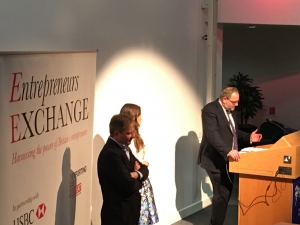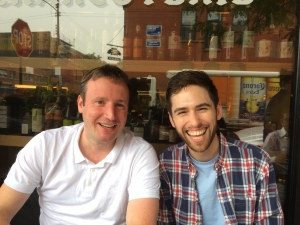
Sean Gilligan (Webanywhere) and Michael Berger (Basecamp)
The old meatpacking district is really taking off in Chicago’s West Loop. With the Google’s Mid-West HQ only 5 minutes away, we met our neighbours Basecamp at our new office for lunch. Basecamp is one of the world’s favorite project management software companies and Jason Fried one of the co-founders has written a number of successful business books such as Rework and Remote both of which have been best sellers with the New York Times and the Wall Street Journal. Jason Fried’s mum was looking to buy an iMac from the local Apple store and the customer experience was so exceptional she recommended that Jason, the co-founder of Basecamp, hire Michael Berger.
Michael had just got back from re-locating his 96-year-old grandmother from Florida and was able to meet myself and my brother for lunch before we jumped on a plane back to the UK. Over lunch we discussed a whole range of issues, including how Basecamp are rewriting their project management software from scratch. Basecamp are definitely getting their name out there – sponsoring music festivals and advising Coursera on some project management courses.
Michael was particularly interested in how Webanywhere gains feedback from its customers. Michael’s role at Basecamp involves QA, and part of the unique work culture at Basecamp means he often works from home in a morning, goes to the gym and then heads to the office. Jason, who leads design, and Daniel who leads engineers, are equals and opposites. Whilst Jason is a permanent residence in Chicagoland and is a well know business-face, Daniel spends time in California and Southern Spain while pursuing his interest in racing cars.
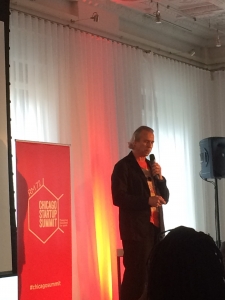
Howard Tullman of 1871, Chicago Startup Summit
Basecamp’s open APIs means it can be integrated with learning management systems such as Moodle. One of the challenges Basecamp has is the education of the user. Users in positions of authority can ensure the whole organisation is using the product, whilst more junior members of staff may struggle to get further buy-in. Basecamp helps SMEs in particular get stuff done by providing best-in-class project management software. In addition, Amazon’s Jeff Bezos is a mentor to Basecamp, who have millions of paying customers and perhaps go against the grain of most software. Basecamp believes in “less as more”. Perhaps this is why they changed their company name from 37signals to Basecamp a number of years ago. Furthermore they trimmed down their product line from several products (such as Campfire, Backpack and Highrise) to just Basecamp.
The “billionaire rule” in business is focus and Basecamp have bet the farm house on their product. They believe you don’t need to spend money on marketing, you just need a great product. Basecamp certainly has a great product, with interested followers and participants such as Bezos.
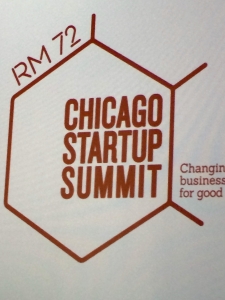
Chicago Startup Summit
Earlier in the week I visited the newly-installed Virgin Hotel in downtown Chicago. The Chicago Startup Summit, held in conjunction with Virgin Unite (The Branson Family’s foundation charity), was held to educate and impact local startups. Seminars were held by One Trick Pony, a design agency based in Philadelphia and Detroit Soup, a crowdsourcing charity featured in a recent BBC documentary. Other people presenting included a number of “Pitch to Rich” finalists who had been flown in from London. Andrew Hunt finished the day talking about how he planned to import a little-known fruit known as the baobab from the African continent, which would ride the current trend of super food consumption whilst providing a profitable harvest for African farmers. Andrew had been in a state of depression as a young marketing executive in London, only to find himself inspired after 4 years living in Africa. Andrew spotted an opportunity of driving demand for the African superfood using his skills and expertise. Richard Branson awarded Andrew’s company £100,000, allowing him to move out of his kitchen and employ 15 staff.
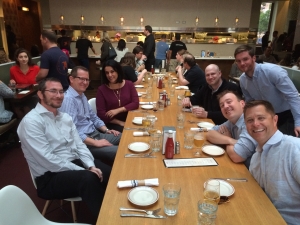
Webanywhere USA Team at The Little Goat, Chicago
What was particularly good about the week in Chicago was seeing other British entrepreneurial startups alongside Webanywhere. Chicago is too often skipped for the more glamorous destinations of New York and San Francisco, but is now becoming a real contender for startups, with the highest proportion of female-led startups in the USA. We on-boarded 3 new members of staff at our Fulton Market office and met a few of our key customers. All in all, another good week in America and my 2nd week in one month – which is a personal record!
